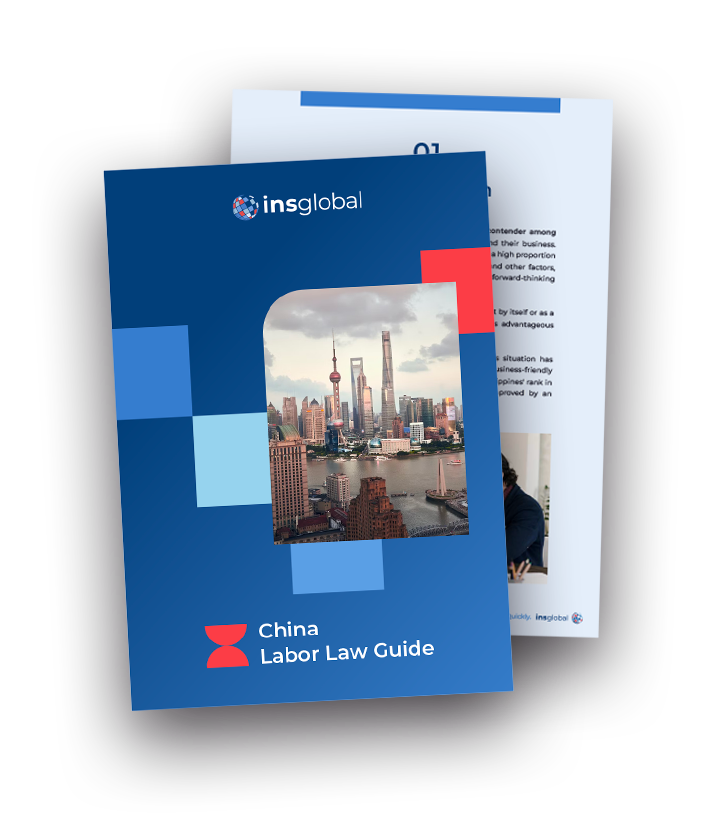Many Western companies are accustomed to using non-compete agreements for employment contracts with high-level employees. This is particularly the case for companies with valuable proprietary assets and know-how. A non-competition agreement prevents an employee from working for a direct competitor once the contract has ended.
The question for companies in China that wish to sign a non-compete agreement is whether a court will enforce the agreement. There are a number of factors that companies in China need to pay attention to when attempting to maximize the likelihood that a non-compete agreement will be upheld by a Chinese court.

Tired of scrolling? Download a PDF version for easier offline reading and sharing with coworkers
In a hurry? Save this article as a PDF
Tired of scrolling? Download a PDF version for easier offline reading and sharing with coworkers.
Fill up the form below 👇🏼
Length of Non-Compete Period
The non-compete period, that is, the period of time that an employee can be prohibited from working for a direct competitor after the employee has left the company, may last for a maximum of two years. A court is unlikely to enforce an agreement with a non-compete period lasting longer than two years (even if it is signed by the employee).
Compensation
An employer is required to pay the former employee some portion of his/her former salary during the non-compete period. During the non-compete period, the employee is entitled to at least 30% of his/her former salary. However, if this amount turns out to be lower than the average salary of the region, the company must pay the average local salary instead.
Compensation during the non-compete period and enforceability of the agreement are closely linked. Therefore, if the employer fails to compensate the employee in a timely fashion, the non-compete agreement will not be enforceable and the employee is essentially free to work for a competitor.
Additionally, any non-compete agreement that does not provide for the employee to continue to receive a portion of his/her former salary will not be enforceable in court, even if it was signed and agreed upon by the employee. Ask an Employer of Record in China to ensure compliance.
Check Our China Labor Law Guide
Learn how the Chinese law is applied in all aspects and situations, from an employer and employee perspective

Relevant Types of Employees
Non-compete agreements may not be used for any employee the company wishes. They are limited to personnel with extensive access to and familiarity with confidential and proprietary information. Relevant positions include the following:
- Senior Management: The senior manager must have extensive access to confidential information.
- Senior Technical Staff: This will most likely be a senior engineer, program manager, or technician who is deeply involved in the company’s research and development and has extensive access to a company’s proprietary information and technology.
Other staff with access to confidential information may potentially have non-compete clauses in their contracts. The enforceability of such a clause, however, will depend on the relevant factors listed below.

Enforceability
Labor courts consider non-enforcement agreements on a case-by-case basis and do not usually conform to a rigid set of rules. A court will consider the following factors when determining the enforceability of a non-compete agreement:
- Salary Level of the Employee
If the employee has an especially high salary, a judge will be more inclined to enforce a non-competitive agreement. For one, the high salary indicates the importance of the position to the company, and thus, the potential sensitivity of the information in the hands of the former employee. Additionally, the high-salary suggests that the compensation during the (post-employment) non-compete period will ensure a reasonable financial position for the former employee that may have difficulties finding work with non-competitor companies.
- The Employee’s Access to Confidential Information
If the employee regularly uses confidential information in his/her work, the non-competitive agreement is more likely to be enforced.
- The Employee’s Ability to Use Confidential Information
If it appears that the confidential information gained in the position may be readily useable and transferrable when working for a competitor, courts will be more inclined to enforce an agreement. Companies should be prepared to demonstrate this if they wish to make such a claim.
- Employee’s Job Title
If the job title appears to be more senior and prestigious, enforceability is more likely.
- Employee Responsibilities
If the employee’s responsibilities are especially important for the company, the agreement is more likely to be enforced.
- A Non-disclosure (NDA) or Similar Agreement was Signed
If the employee signed a separate agreement with the employer to protect the proprietary information of the company, the non-compete clause is more likely to be enforced.
- Employee’s Financial Circumstances
If the employee is under greater financial stress, a labor court may be less inclined to enforce the agreement, as doing so may damage the employee’s wellbeing. This may also depend on other factors, such as the employee’s prospects for employment outside of the niche of the company. If the employee is deemed to have great job prospects in a different market, the judge may be more willing to enforce the non-compete.
Ending a Non-Compete Agreement
As a non-compete agreement requires the employer to compensate the former employee after he/she has left the company, some employers may wish to end the non-compete agreement to avoid paying compensation. However, employers are not entitled to freely end the non-compete agreement without compensating the employee.
For an employer to terminate the agreement during the non-compete period, the company will likely be required to pay the employee three months salary. There may be potential to terminate the agreement before the non-compete period has begun without offering so much compensation, however, this will depend on the region and be determined on a case-by-case basis.
A non-compete agreement that gives the employer the right to unilaterally terminate the agreement at any time without offering compensation is very unlikely to be enforced by the authorities.
Violation of Non-Compete Agreements
If a court orders an employee to pay damages for violating a non-compete agreement, the agreement can remain in effect, if the employer wishes. In other words, the payment of damages, whether paid by the former employee or his/her new employer, does not serve as a substitute for honoring the non-compete.
Non-Competitive Agreements in China: Conclusion
It is important to remember that what is signed and agreed-upon by both parties in the non-compete will not necessarily be enforced. The rules and legal uncertainties necessitate that companies thoroughly consider whether signing a non-compete is worthwhile.
Failure to consider the long-term situation may result in very high costs, as non-compete agreements may not be freely cancelled without compensating the employee.

SHARE